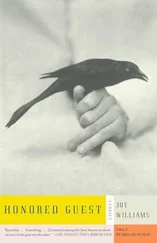Joy Williams - Taking Care
Здесь есть возможность читать онлайн «Joy Williams - Taking Care» весь текст электронной книги совершенно бесплатно (целиком полную версию без сокращений). В некоторых случаях можно слушать аудио, скачать через торрент в формате fb2 и присутствует краткое содержание. Год выпуска: 2010, Издательство: Vintage, Жанр: Современная проза, на английском языке. Описание произведения, (предисловие) а так же отзывы посетителей доступны на портале библиотеки ЛибКат.
- Название:Taking Care
- Автор:
- Издательство:Vintage
- Жанр:
- Год:2010
- ISBN:нет данных
- Рейтинг книги:5 / 5. Голосов: 1
-
Избранное:Добавить в избранное
- Отзывы:
-
Ваша оценка:
- 100
- 1
- 2
- 3
- 4
- 5
Taking Care: краткое содержание, описание и аннотация
Предлагаем к чтению аннотацию, описание, краткое содержание или предисловие (зависит от того, что написал сам автор книги «Taking Care»). Если вы не нашли необходимую информацию о книге — напишите в комментариях, мы постараемся отыскать её.
Taking Care — читать онлайн бесплатно полную книгу (весь текст) целиком
Ниже представлен текст книги, разбитый по страницам. Система сохранения места последней прочитанной страницы, позволяет с удобством читать онлайн бесплатно книгу «Taking Care», без необходимости каждый раз заново искать на чём Вы остановились. Поставьте закладку, и сможете в любой момент перейти на страницу, на которой закончили чтение.
Интервал:
Закладка:
The day after they moved in, she had walked down there and stood on the little dock, looking up and down as though she were waiting for a bus. The woods were thick and purplish and ran right into the water. There wasn’t any shore. There was the high land and then a line of ropy contorted trees with all the roots exposed like the tendons in an arm, and then the water. And there wasn’t any sun. Although it was noon, the light was second-hand and shabby. The sun was enmeshed in a high tree, tangled in the hanging moss, beating feebly or not at all, like something subject to wind or exhaustion. She looked upstream and there was a gentle wide turn to the river and the woods turned black and flaky. White birds were milling, falling down to the water and then being sucked up again, as though by a draft, with no wingbeat and no cry.
Nothing looked as though it were about to change from one week to the next. She bent slightly at the waist and looked straight down. The river bottom was red and the water was different colors at different depths — saffron, red, black. Fish hung ornamentally above a rusting can. A steering wheel from a car was wedged between two logs. She lay down on her stomach and poked at the water with her hand. Bored, she splashed and patted the surface. Two otters erupted for air a foot beyond her lowered head, sleek and toothy with a sound like escaping gas. She shrieked, and ran back to the trailer.
She flung herself on the bed and wept for an hour, and nothing her husband could do would stop her. Finally, she took a hot bath and drank three martinis. The otters were the same otters which had terrified her as a child when they were in a color plate, swimming in the Book of Knowledge. She had never been able to remember what volume they were in and was therefore always coming across them. It became a dangerous thing to do her homework. Even when her father had cut the picture out, she would see other things that resembled the otters and she felt that her entire childhood had been ruined. She told this all to her husband. He didn’t know what to say. He kissed her and held her on his lap and covered them both with a quilt.
Her name was Lola and she was young and had a pretty face. Her husband Jim had a pretty face too, which was why he was a television newscaster rather than being just another newsman. He had brown heavy hair, carefully cut and combed, and was tall and thirty years old. He would look thirty for the next two decades, which worried Lola.
Jim worked in the capital. It wasn’t much of a town but it was crowded with state office buildings and two colleges and an agricultural school, and when he had started to look for a house late in the summer, there wasn’t anything to rent. Each day he drove further and further from the town on some realtor’s suggestion, Lola by his side, biting her nails and occasionally giving a little cry as though she had been pinched. All they passed were pines and careless farms and an occasional house with a dirt yard and a sign advertising yard eggs and crickets and rabbits. Lola wouldn’t look any more. She put her head on his lap and listened to the radio.
The day he finally found the trailer and paid the rent, she wasn’t with him. She had a headache pain and was staying behind in the motel room, calling all their friends in the town they had left behind, remembering good times together. The trailer was thirty miles from the capital on blacktop and then another four down a logging road, and was in the next state. He told her that it didn’t have a phone but it had a CB radio and an air-conditioner, washing machine, vacuum cleaner, conversation pit and wall-to-wall carpeting. When she arrived, there was half a watermelon in the refrigerator, two jars of cane syrup beneath the sink, and an unflushed toilet. There was a little lawn, a mangled garden within a square of sticks and string, and then the deep bruised woods, thick as a velvet curtain. The ground all around the trailer was red. Lola felt that it looked idiotic, as though someone had tried to pretty the place up.
There were deer, bear, coon, possum, boar and turkey. Up the river, in the spring, men brought skiffs full of bees to the tupelo trees in the swamp.
“That would be something to watch for, love,” Jim said. “Once I saw a man covered with bees. They hung off his clothes and all over his face. He walked by my house, going home. He had lost the queen but had found her again and he was covered with black bees, hardly able to see his way.”
Lola looked vacantly at him for a long time and then began to drum her knees with her fists. “I don’t want to see anything like that! I want to be out of here before Christmas!”
Down the river, eight or so miles, was the Gulf of Mexico. He assured her it was there, but she went to sleep and dreamed that she followed the river and it ended only in a fourteenth-century European town of freaks and circuses. Everything was violent or deformed. Tattooed children were being sold, and tiny dead songbirds, clustered like grapes. The river was green and full of animals, stopping abruptly at the town and never appearing again, as though it were painted on, an apron of a stage. Ballistas were mounted on the walls and hides were drying in the sun and everyone was calling to her.
Whimpering, she woke him up. In the night, something screamed. She could not tell if it was an animal or a bird or whether the process was of slaughter or slaughtering. She kept plucking at her husband’s arm, long after he had awakened and turned on the light. He was a very handsome young man with clear untroubled eyes. People depended upon him to dispense events. Lola saw it simply. Without his telling, it did not exist, and after he had related it, it became harmless verbiage. Everything could be reduced by the mentioning of it. She had married him because he made her feel secure. Sometimes, when he was narrating a television special and the show had been pre-taped, he was both on the screen and by her side, and she was dizzy with relief. Those were the times when she understood best her love for him.
“I hate this place,” she said shrilly, releasing his arm now and squeezing the bedclothes around her fingers. “I hate it! I hate the river and this awful trailer. I hate these woods!” She watched him with large indignant eyes, the dream already relaxing its grip on her mind, the reason for waking up and needing him going further and further away, almost lost. She was sleepy again. The bed was so warm where he lay. “Hate,” she said. “I’m full of hate.” He laughed and kissed her on the mouth. Both knew she could not concentrate on anything for very long.
The next morning, she scrubbed at a pot she had left soaking in the sink. Two mice had fallen into the grey water and drowned. She groped at them, thinking they were loosened noodles, screamed and returned to bed. Jim coaxed her up and took her into town with him, the car lurching toward the paved road in the ruts of the logging trucks. They swam through soft hollows, butterflies caroming softly across the windshield.
“If we had a little rain,” Jim said, “it would fix up this road.”
In the brown grass were wooden barrels of turpentine gum. They came upon a group of Negroes prying the tin pans off the trees and emptying them into the barrels. They wore wide green trousers and denim jackets and shoveled the gum out of the pans with thick sticks. They all stopped working as the car approached and stared at it expressionlessly as it lumbered past. Lola pressed her foot against the floorboards of the car, beating on an imaginary throttle. The car hung in the space before the men and then left them slowly behind, dusting their boots. In the bullet-shaped mirror on the fender, two wide hands rose in an ambivalent gesture.
“What?” Lola said, patting at her hair, looking at the woods again. “What?”
Читать дальшеИнтервал:
Закладка:
Похожие книги на «Taking Care»
Представляем Вашему вниманию похожие книги на «Taking Care» списком для выбора. Мы отобрали схожую по названию и смыслу литературу в надежде предоставить читателям больше вариантов отыскать новые, интересные, ещё непрочитанные произведения.
Обсуждение, отзывы о книге «Taking Care» и просто собственные мнения читателей. Оставьте ваши комментарии, напишите, что Вы думаете о произведении, его смысле или главных героях. Укажите что конкретно понравилось, а что нет, и почему Вы так считаете.












